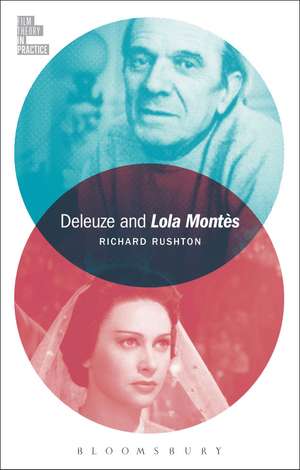Deleuze and Lola Montès: Film Theory in Practice
Autor Dr Richard Rushtonen Limba Engleză Paperback – 9 dec 2020
| Toate formatele și edițiile | Preț | Express |
|---|---|---|
| Paperback (1) | 112.18 lei 3-5 săpt. | |
| Bloomsbury Publishing – 9 dec 2020 | 112.18 lei 3-5 săpt. | |
| Hardback (1) | 403.87 lei 6-8 săpt. | +70.97 lei 4-10 zile |
| Bloomsbury Publishing – 9 dec 2020 | 403.87 lei 6-8 săpt. | +70.97 lei 4-10 zile |
Preț: 112.18 lei
Preț vechi: 138.18 lei
-19% Nou
Puncte Express: 168
Preț estimativ în valută:
21.47€ • 22.47$ • 17.76£
21.47€ • 22.47$ • 17.76£
Carte disponibilă
Livrare economică 17-31 martie
Preluare comenzi: 021 569.72.76
Specificații
ISBN-13: 9781501345753
ISBN-10: 1501345753
Pagini: 200
Dimensiuni: 127 x 197 x 17 mm
Greutate: 0.2 kg
Editura: Bloomsbury Publishing
Colecția Bloomsbury Academic
Seria Film Theory in Practice
Locul publicării:New York, United States
ISBN-10: 1501345753
Pagini: 200
Dimensiuni: 127 x 197 x 17 mm
Greutate: 0.2 kg
Editura: Bloomsbury Publishing
Colecția Bloomsbury Academic
Seria Film Theory in Practice
Locul publicării:New York, United States
Caracteristici
Guide readers through the major categories of Deleuze's writings on cinema and of how these categories relate to Deleuze's philosophy as a whole
Notă biografică
Richard Rushton is Senior Lecturer in Film at Lancaster University, UK. He is author of Cinema After Deleuze (2012), The Reality of Film (2011), The Politics of Hollywood Cinema (2012), and What is Film Theory? (co-written with Gary Bettinson, 2010).
Cuprins
IntroductionSection 1: Deleuze's Cinema: Movement, Time, Memory, and Subjectivity Section 2: The Time-Image and Lola MontèsConclusionFurther ReadingBibliography
Recenzii
Deleuze and Lola Montes offers an articulate and accessible introduction to Deleuze's theories as well as an instructive case study of how to use Deleuze's writings on cinema to illuminate particular films.
Deleuze and Lola Montès unpacks the intricate interweaving of Deleuze's theories of cinematic image, time, and subjectivity. The clarity of this work has the capacity to make the teaching of the Cinema books an enjoyable experience; no easy task, something anyone who has attempted to teach them will confirm. Furthermore, the work does so without smoothing over the complexities of Deleuze's thinking. This goes far beyond what one might expect from a text book. Rushton's scholarship will enable readers to understand the conceptual tenets of the Cinema books while guiding them through Deleuze's philosophical lineage from Spinoza, Nietzsche, and Bergson. Along the way, the reader learns how Deleuze's rigorous interrogation of time and subjectivity, in addition to his response to and revision of these philosophers, is threaded through his film theory. Deleuze's Cinema books comprise an innovative and unique way of engaging in film texts. It will be exciting to see how, through this exceptional textbook, film students enter conversations with Deleuze that will reverberate in their theoretical thinking and efforts in cinematic image making. This is a fortunate opportunity for theory and practice to meet in the film studies classroom.
A brilliant idea in popularizing Deleuze's theory through a masterpiece in European cinema. This may also lead to further work on Ophuls and Deleuze.
Deleuze and Lola Montès unpacks the intricate interweaving of Deleuze's theories of cinematic image, time, and subjectivity. The clarity of this work has the capacity to make the teaching of the Cinema books an enjoyable experience; no easy task, something anyone who has attempted to teach them will confirm. Furthermore, the work does so without smoothing over the complexities of Deleuze's thinking. This goes far beyond what one might expect from a text book. Rushton's scholarship will enable readers to understand the conceptual tenets of the Cinema books while guiding them through Deleuze's philosophical lineage from Spinoza, Nietzsche, and Bergson. Along the way, the reader learns how Deleuze's rigorous interrogation of time and subjectivity, in addition to his response to and revision of these philosophers, is threaded through his film theory. Deleuze's Cinema books comprise an innovative and unique way of engaging in film texts. It will be exciting to see how, through this exceptional textbook, film students enter conversations with Deleuze that will reverberate in their theoretical thinking and efforts in cinematic image making. This is a fortunate opportunity for theory and practice to meet in the film studies classroom.
A brilliant idea in popularizing Deleuze's theory through a masterpiece in European cinema. This may also lead to further work on Ophuls and Deleuze.













